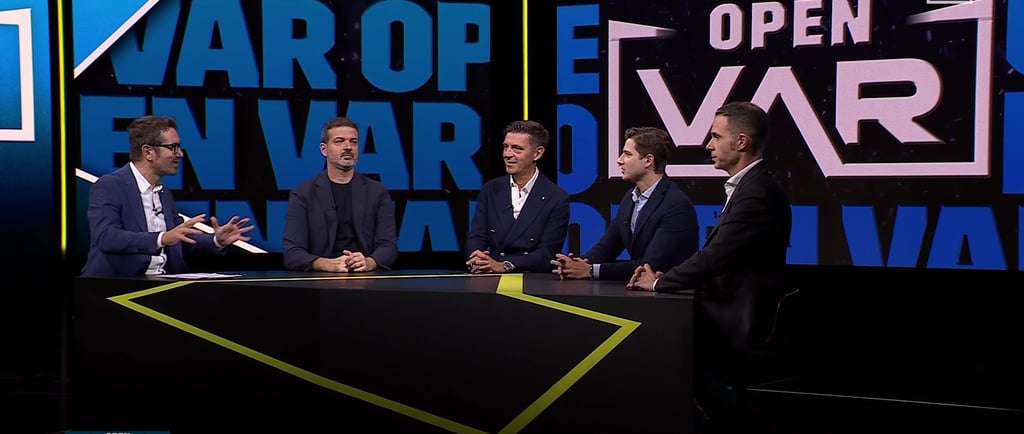AIA "SU WALKER MANCA L'INTENSITÀ. TOMORI LIMITE DEL VAR"
NEWS


10 febbraio 2025
Nel corso della puntata di "Open Var" su DAZN, Elenito Di Liberatore del CAN (Commissione Arbitro Nazionale, Organo Tecnico dell'AIA, alla quale competono le designazioni di arbitri ed assistenti per le gare dei campionati) ha commentato gli episodi più contestati del weekend soffermandosi proprio sui casi di Empoli-Milan.
MANCATO CARTELLINO A CACACE - Questo l'audio tra arbitro e VAR sull'episodio Cacace-Walker. "Mi controlli come è intervenuto? Perché per me è un tocco minimo", chiede Pairetto. Serra e Chiffi al VAR: "Non c'è grande intensità, però... In velocità normale è brutto. Cacace lascia la gamba. Il difensore continua a scivolare però non è mai piantato a terra... Check completato".
Il commento di Di Liberatore: "Qui ovviamente partiamo dalla fine. Corretto non intervenire dal punto di vista VAR perché manca l'intensità. Pertanto è corretto non intervenire per la revisione. Il giallo sarebbe stato giusto".
IL SECONDO GIALLO E IL ROSSO A TOMORI - Di Liberatore poi spiega cosa è successo sull'espulsione di Tomori: "Il VAR non è potuto intervenire perché è fuori protocollo. In caso di rosso diretto era opportuna revisione VAR, ma trattandosi di doppia ammonizione il VAR era tagliato fuori. Se l'arbitro avesse sbagliato ed estratto il rosso, sarebbe stato richiamato. Per quanto riguarda il fuorigioco, trattandosi di poco, è una fattispecie complessa per l'assistente. Però è stato bravo in corso d'opera lo stesso assistente nel collaborare legittimamente con l'arbitro".
Interviene Emanuele Giaccherini: "Il regolamento è da rivedere secondo me. Va bene non intervenire su ogni giallo, ma se come in questo caso determina un'espulsione è da rivedere".
Gli fa eco Ciro Ferrara: "Questo caso fa casistica, è da portare. Il regolamento lo fa l'Ifab, questa è una situazione da portare all'attenzione per capire come risolverla. E' troppo punitiva per il giocatore che fa il fallo".
Di Liberatore: "Ogni anno c'è una discussione per cercare di migliorare step by step per migliorare".
EN VERSION
During the episode of "Open VAR" on DAZN, Elenito Di Liberatore from CAN (National Referee Commission, the Technical Body of AIA responsible for appointing referees and assistants for league matches) analyzed the most controversial incidents of the weekend, focusing specifically on the cases from Empoli-Milan.
MISSED YELLOW CARD FOR CACACE
This was the audio exchange between the referee and VAR regarding the Cacace-Walker incident.
"Can you check how he intervened? Because for me, it’s minimal contact," asks Pairetto. Serra and Chiffi at VAR respond: "There is no great intensity, but… At normal speed, it looks bad. Cacace leaves his leg. The defender keeps sliding but is never firmly planted on the ground… Check completed."
Di Liberatore’s comment: "Here, we obviously start from the end. It was correct not to intervene from a VAR perspective because the intensity is lacking. Therefore, it was right not to review it. However, a yellow card would have been appropriate."
SECOND YELLOW CARD AND RED CARD FOR TOMORI
Di Liberatore then explains what happened regarding Tomori’s expulsion:
"VAR could not intervene because it was outside the protocol. In the case of a direct red card, a VAR review would have been appropriate, but since it was a second yellow, VAR was excluded. If the referee had made a mistake and shown a straight red, he would have been called back. Regarding the offside, since it was marginal, it was a complex situation for the assistant. However, the assistant did well in collaborating with the referee during the play."
Emanuele Giaccherini then intervenes: "The regulation needs to be reviewed in my opinion. It’s fine not to intervene on every yellow card, but if, as in this case, it leads to a sending-off, it should be reconsidered."
Ciro Ferrara echoes this sentiment: "This case sets a precedent and should be discussed. The rules are made by IFAB, and this is a situation that should be brought to their attention to find a solution. It is too punitive for the player committing the foul."
Di Liberatore concludes: "Every year, discussions take place to improve things step by step."
